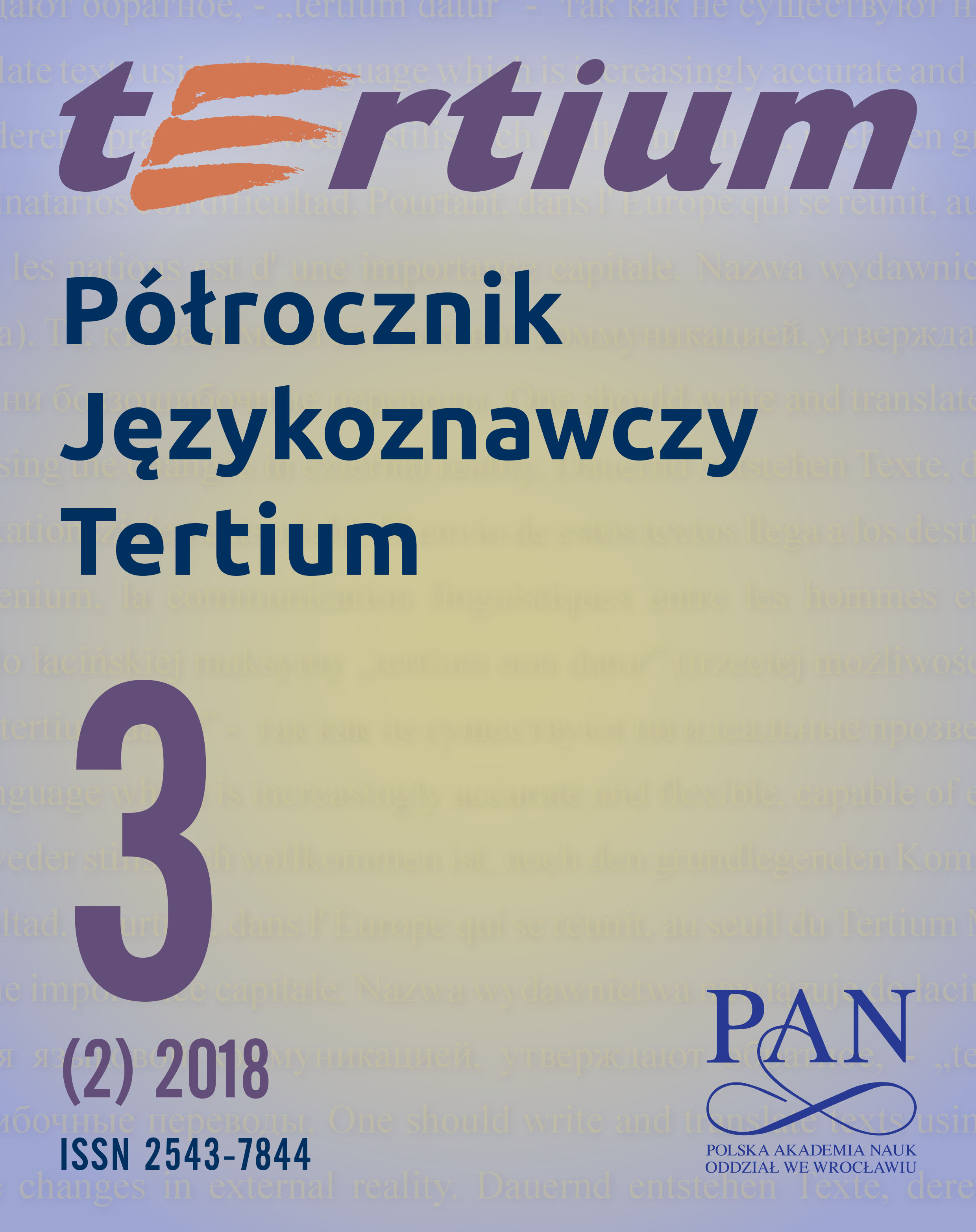Teoretyczne wybory, cięcia metodologiczne i przejścia między paradygmatami:
Theoretical Choices, Methodological Cuts and Transitions between Paradigms:
Moot Issues of Interdisciplinary Dialogue
Author(s): Françoise Collinet, Katarzyna Kwapisz-OsadnikSubject(s): Language and Literature Studies, Applied Linguistics, Communication studies, Philology
Published by: Krakowskie Towarzystwo Popularyzowania Wiedzy o Komunikacji Językowej Tertium
Keywords: interdisciplinary approach; New Rhetoric; argumentation; predicate
Summary/Abstract: W niniejszym artykule podjęto próbę refleksji nad problemem wyboru zaplecza teoretycznego z jednej strony, a kwestią prowadzenia wywodu naukowego z drugiej - w obliczu współczesnego interdyscyplinarnego kierunku badań. Punkt wyjścia rozważań w tym zakresie stanowi rozumie-nie interdyscyplinarności we Francji oraz tezy Nowej Retoryki, ktόre same mogą być rozważane jako interdyscyplinarne. Co więcej Nowej Retoryki można używać, żeby opisać dialog między różnymi dyscyplinami. Odnosząc się do pojęcia predykat inaczej rozumianego w obszarze pol-skich i francuskich badań językoznawczych, w artykule opisano podstawowe dylematy, niezro-zumienia i trudności w dialogu naukowym, wywodzącym się z różnych (francuskiej i polskiej) tradycji uniwersyteckich. W tym kontekście Nowa Retoryka mogłaby odegrać rolę platformy dialogu między badaczami reprezentującymi różne tradycje naukowe, gdyż z jednej strony bie-rze pod uwagę związek między i formacją badacza a przedwstępnymi postanowieniami, a z dru-giej strony wprowadza termin "rozciągłość pojęć", na którym może opierać się argumentacja. W prowadzeniu badań opartych na dialogu interdyscyplinarnego ważne jest „spojrzenie z od-dali" (Lévi-Strauss, 1983), czyli pewien dystans do swojej dyscypliny, tradycji i dociekań tak, aby nasze prace naukowe stały się dostępne dla badaczy reprezentujących inne dyscypliny, ale przede wszystkim, aby możliwy był dialog w ramach tych samych dyscyplin. // This article is an attempt to reflect upon the problem of choosing a theoretical approach. From another side, it touches upon the question of conducting scientific enquiry- in the face of the actual inter-disciplinary turn taken in some fields of research. The starting point of these reflec-tions in this particular field will be the concept of interdisciplinarity as understood in France and the claims of the New Rhetorics which can themselves be understood as being interdiscipli-nary. Moreover, the New Rhetoric can be used to describe a dialogue between different disci-plines. In reference to the concept of predicate, which has different meanings in the fields of French and Polish linguistic research, the present article will touch upon fundamental dilemmas, mis-understandings and difficulties in scientific debate and the problems which stem from the dif-ferences between the French and Polish academic traditions. In this context, the New Rhetoric could play the role of a platform for dialogue between researchers representing different scien-tific traditions, because on the one hand, the New Rhetoric takes into account the relation be-tween the researcher’s formation and his prior representations concerning the matter. On the other hand, the New Rhetoric introduces the term 'plasticity of notions' based on which argu-mentation can be founded or based. In conducting research founded on interdisciplinary dia-logue it is important to adopt “a view from afar” (Levi-Strauss 1983); or, in other words, to maintain a certain distance from one's discipline, tradition and a way of querying, so that our scientific works would become comprehensible for scholars representing different disciplines and above all, to enable a dialogue within the framework of those disciplines.
Journal: Półrocznik Językoznawczy Tertium
- Issue Year: 3/2018
- Issue No: 2
- Page Range: 1-13
- Page Count: 13
- Language: Polish

